Social media is a powerful tool for startups. It helps build brand presence, reach new audiences, and engage with customers. Startups can compete with bigger players by using social platforms effectively. It’s about showcasing products, sharing values, and building a community—all on a limited budget. According to a study by Clutch, 71% of small businesses use social media to market themselves, and of those, 52% post at least daily. Social media offers visibility, but it’s the meaningful interactions that truly count. These interactions lead to loyal customers and steady growth.
Managing social media isn’t easy, though. Startups have limited time and resources. Staying active across multiple platforms takes effort. Creating content, engaging followers, and tracking metrics can feel overwhelming. Many startups struggle to keep up. This is where social media management tools can help. They simplify the process and make social media more manageable. In fact, using social media management tools can save businesses over 6 hours per week, as reported by eMarketer.
In this article, we’ll explore what makes these tools a game-changer for startups. We’ll cover how to choose the right tool, look at the top tools available, compare features, and share tips for maximizing efficiency. The goal is to help you find the right fit that will turn social media into a growth engine for your business.
What to Look for in a Social Media Management Tool
Choosing the right social media management tool is crucial for startups. It’s about finding the balance between features, usability, and cost. The best tools are those that cater specifically to a startup’s unique needs. Here are some key aspects to consider:
1. Ease of Use
The tool should have a user-friendly interface. Startups often lack the time for steep learning curves. A simple, intuitive design makes it easy for even non-experts to manage social media efficiently.
2. Platform Integration
Integration across multiple platforms is a must. Startups need to reach audiences on Instagram, Twitter, LinkedIn, and more. The right tool should support these platforms seamlessly, allowing you to post and engage from one place.
3. Content Scheduling and Automation Features
Automation is a lifesaver. Look for tools with features like bulk scheduling, post-timing optimization, and automated reposting. These features save time and ensure that your content reaches audiences at the best possible times.
4. Analytics and Reporting
Tracking performance is essential. The right tool should provide in-depth metrics that help optimize campaigns. Knowing what content resonates best allows startups to refine their approach and grow effectively.
5. Budget Considerations
Startups need to be mindful of costs. Look for tools with flexible pricing models—free plans, pay-as-you-go, or affordable monthly subscriptions. Scalability is key, so find a tool that can grow with your business needs.
Top Social Media Management Tools for Startups
1. Buffer

Buffer is all about simplicity and efficiency. It’s a great starting point for any startup looking to establish a social media presence without getting bogged down in complex features.
Overview: Buffer is a simple yet effective tool for scheduling posts. It’s designed to be easy to use, making it an ideal choice for startups just beginning their social media journey. Buffer offers essential features to help businesses maintain an active social presence without getting overwhelmed.
Features:
| Feature | Description |
| Content Scheduling | Schedule posts across multiple platforms. |
| Multi-Platform Support | Supports Facebook, Instagram, Twitter, etc. |
| Visual Calendar | Plan and visualize content easily. |
Best For: Buffer is best for startups looking for an affordable, user-friendly scheduling solution that helps them get started with social media management without unnecessary complexities.
2. Hootsuite
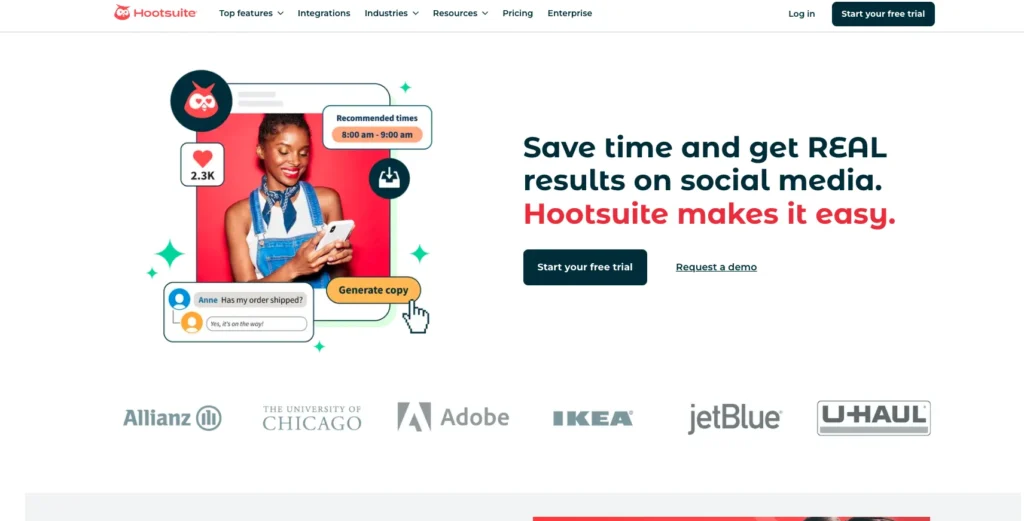
Hootsuite is a veteran in the social media management space. Known for its comprehensive features, it’s a powerful tool for startups ready to take their social media strategy to the next level.
Overview: Hootsuite is a versatile social media management platform that caters to businesses of all sizes. It offers an extensive range of features, making it easy for startups to manage multiple accounts effectively. Hootsuite helps teams stay on top of their social strategy with advanced analytics and scheduling options.
Features:
| Feature | Description |
| Social Listening | Monitor brand mentions and keywords. |
| Performance Tracking | Detailed analytics to measure success. |
| Scheduling | Automate post publishing across platforms. |
Best For: Hootsuite is best for startups needing advanced analytics and extensive platform integration to manage multiple social channels efficiently.
3. Sprout Social
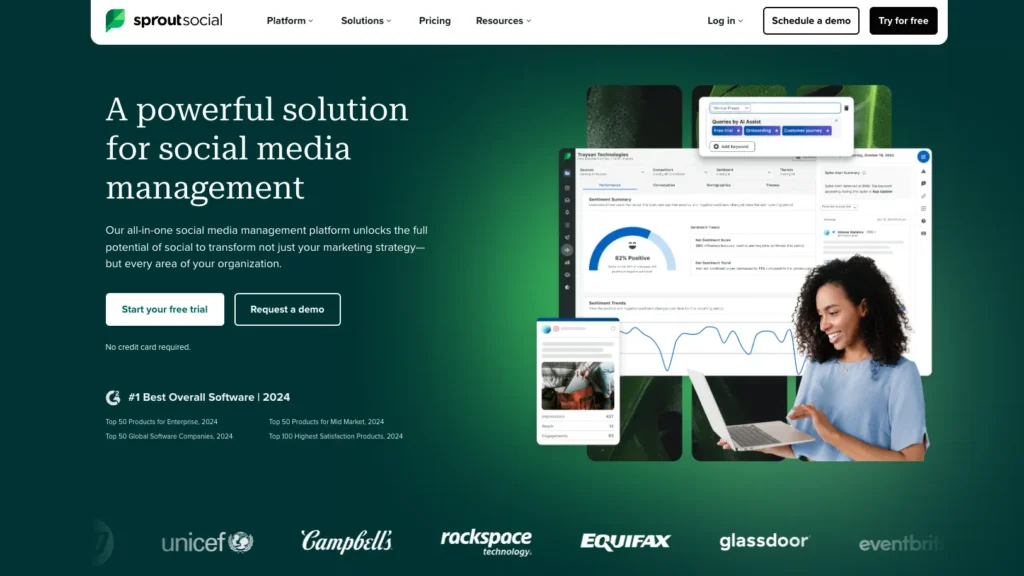
Sprout Social is all about helping teams collaborate and understand their social media performance. With its robust analytics and team features, it’s perfect for startups that are scaling up.
Overview: Sprout Social is known for its robust analytics and collaboration features, making it ideal for startups with growing teams. It offers deep insights into social performance and provides tools to facilitate teamwork, ensuring everyone is on the same page when executing a social strategy.
Features:
| Feature | Description |
| In-Depth Reporting | Comprehensive analytics and reporting. |
| Social Listening | Monitor trends and customer sentiment. |
| Team Collaboration | Assign tasks and collaborate easily. |
Best For: Sprout Social is best for startups that need detailed insights and strong collaboration features, helping teams work together efficiently on social media initiatives.
4. SocialBee

SocialBee focuses on engagement and content management. If you’re looking to build a loyal following with consistent, categorized content, this could be the tool for you.
Overview: SocialBee focuses on helping startups boost audience engagement through effective content categorization and targeted scheduling. It provides the tools needed to keep your audience engaged while maintaining consistency across all your social channels, all at an affordable price.
Features:
| Feature | Description |
| Content Categorization | Organize posts by categories. |
| Community Engagement | Tools to engage with audiences effectively. |
| Scheduling | Plan content for different platforms. |
Best For: SocialBee is best for startups looking for affordable tools that maximize engagement, providing a solid balance between features and cost-effectiveness.
5. Later
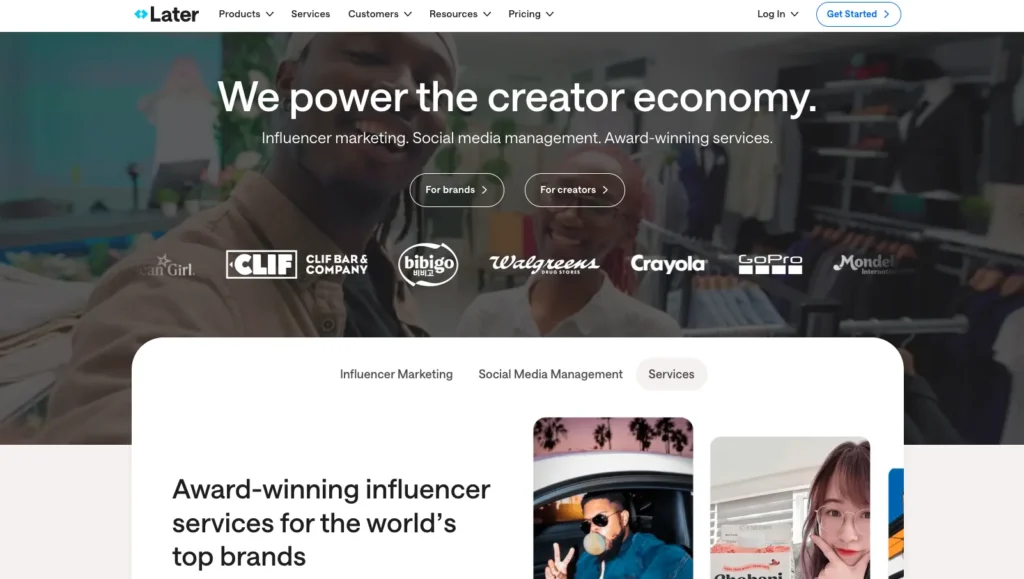
Later puts the spotlight on visual content. It’s a top choice for startups whose social media strategy heavily relies on platforms like Instagram and Pinterest.
Overview: Later is perfect for startups focusing on visual content, especially Instagram and Pinterest. It’s simple to use, budget-friendly, and designed to help businesses visually plan and schedule their content, ensuring posts are consistent and on-brand.
Features:
| Feature | Description |
| Drag-and-Drop Scheduler | Visual scheduling for Instagram posts. |
| Media Library | Store and organize media files. |
| Hashtag Suggestions | Find effective hashtags for better reach. |
Best For: Later is best for startups with a strong focus on visual social media platforms, making it ideal for businesses that rely heavily on Instagram and Pinterest for brand promotion.
6. Zoho Social
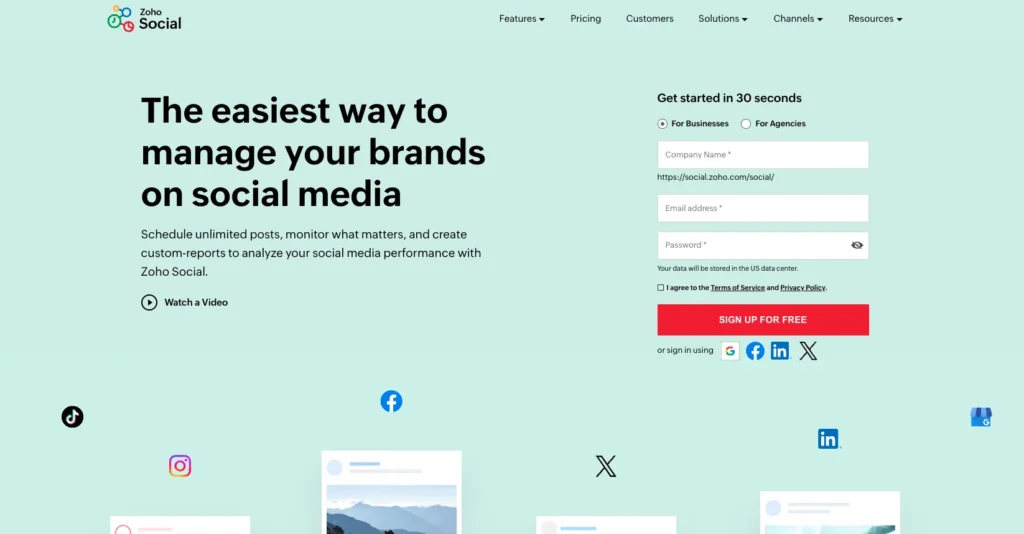
Zoho Social is part of the larger Zoho ecosystem. It’s particularly beneficial for startups already using other Zoho products, offering seamless integration and a unified workflow.
Overview: Zoho Social integrates seamlessly with other Zoho products, making it an ideal choice for startups already using Zoho’s suite. It offers essential social media features with the added benefit of CRM integration, helping startups manage their social and sales processes cohesively.
Features:
| Feature | Description |
| CRM Integration | Integrates with Zoho CRM for lead tracking. |
| Scheduling | Plan and publish posts across platforms. |
| Social Listening | Track brand mentions and engagement. |
Best For: Zoho Social is best for startups using Zoho products, looking for a fully integrated solution that combines social media management with CRM capabilities.
7. MeetEdgar
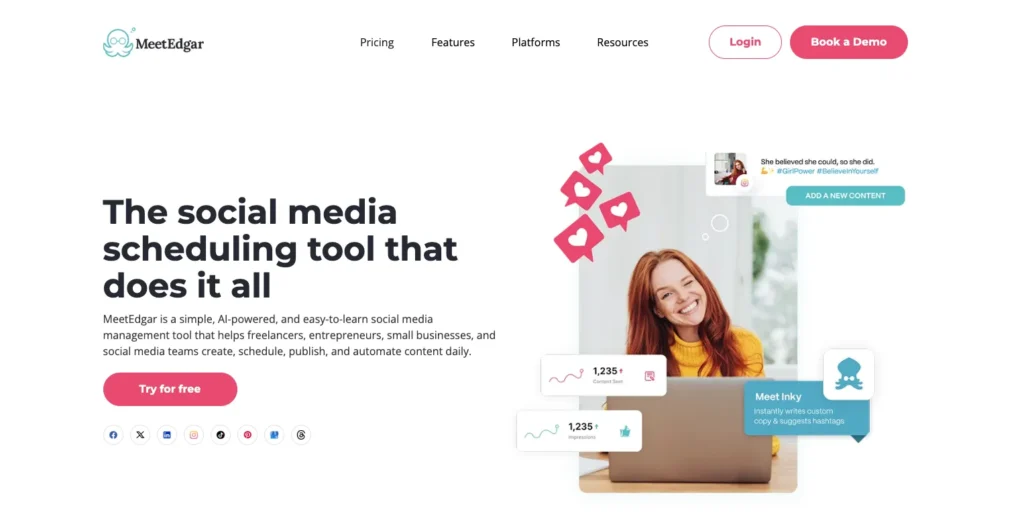
MeetEdgar is all about content recycling. It’s a smart pick for startups that want to maximize the value of their evergreen content without constantly creating new posts.
Overview: MeetEdgar simplifies content repurposing by automatically recycling posts, ensuring maximum exposure for your content. It’s perfect for startups that want to get the most mileage out of their evergreen content without constantly creating new posts.
Features:
| Feature | Description |
| Content Recycling | Automatically republish evergreen content. |
| Category Scheduling | Organize content by categories. |
| Automation | Automate repetitive social media tasks. |
Best For: MeetEdgar is best for startups looking to maximize the lifespan of their content through efficient repurposing and automation.
8. Sendible
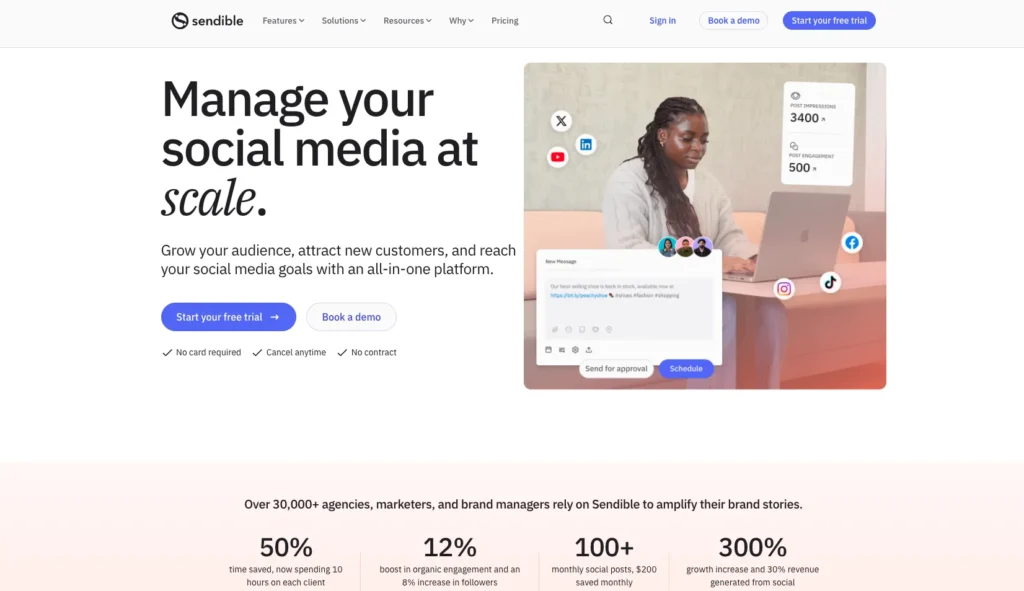
Sendible is designed for managing multiple brands or clients. It’s a great choice for startups that are also handling social media for others, offering a high degree of customization.
Overview: Sendible is a powerful tool for startups managing multiple brands. It provides custom dashboards, collaboration features, and detailed analytics, making it easy to tailor the platform to fit specific client needs. It’s great for startups working with several clients or brands at once.
Features:
| Feature | Description |
| Custom Dashboards | Personalize dashboards to suit needs. |
| Social Listening | Monitor mentions and brand sentiment. |
| Scheduling | Plan and publish posts across platforms. |
Best For: Sendible is best for startups managing multiple brands or clients, offering customization and powerful tools to streamline social media management for each brand.
9. Agorapulse
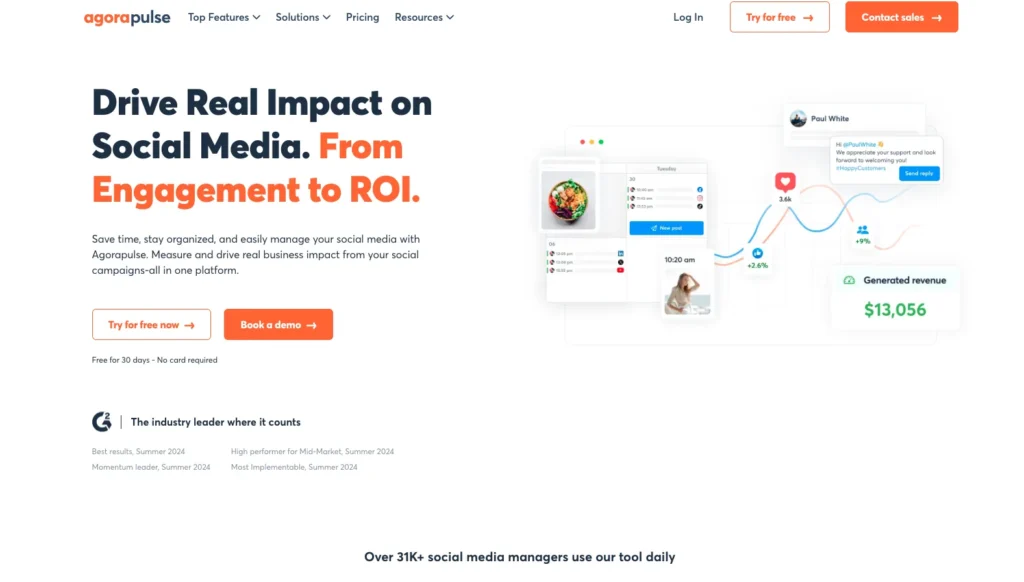
Agorapulse is focused on streamlining social media engagement. Its unified inbox is a standout feature, making it easier to manage conversations across multiple platforms.
Overview: Agorapulse is designed to help startups streamline social engagement. It features a unified inbox, which makes managing audience interactions from multiple platforms simple and efficient. Agorapulse also offers easy-to-use reporting tools to track engagement and performance.
Features:
| Feature | Description |
| Inbox Management | Centralized inbox for messages and comments. |
| Queue Categories | Organize content for easy scheduling. |
| Reporting | Measure engagement and performance. |
Best For: Agorapulse is best for startups needing strong engagement tools to manage and track audience interactions effectively across all channels.
10. Planoly

Planoly is another visually-oriented tool, designed for Instagram and Pinterest. Its drag-and-drop interface simplifies the process of creating a cohesive and attractive feed.
Overview: Planoly is a visual planner that helps startups effectively manage content on Instagram and Pinterest. It offers an easy drag-and-drop interface, allowing businesses to visually organize their posts and create a consistent look and feel across their profiles.
Features:
| Feature | Description |
| Visual Planner | Drag-and-drop content planner. |
| Hashtag Management | Save and reuse hashtag groups. |
| Scheduling | Plan posts for visual platforms. |
Best For: Planoly is best for startups focusing on Instagram and Pinterest, offering an intuitive, visual approach to content planning and management.
11. CoSchedule

CoSchedule takes a holistic approach to marketing, combining content and social media planning. It’s ideal for startups that want a unified strategy for their marketing activities.
Overview: CoSchedule is an all-in-one marketing calendar that brings content and social media planning together. It helps startups streamline their marketing activities by integrating social scheduling with content strategy, ensuring all efforts are aligned for maximum impact.
Features:
| Feature | Description |
| Marketing Calendar | Plan and schedule all marketing activities. |
| Social Automation | Automate posts and manage schedules. |
| Content Integration | Combine blog and social planning. |
Best For: CoSchedule is best for startups wanting a unified content and social media strategy, making it easy to manage all marketing activities from one central place.
Comparing Social Media Tools Based on Startup Needs
Choosing the right social media management tool requires understanding how they stack up against each other. Startups have different needs, and it’s important to evaluate tools based on usability, features, and affordability.
1. Ease of Use Comparison
Buffer and Later are the most user-friendly tools for startups. They both offer intuitive interfaces that make scheduling and posting easy for teams without a dedicated social media expert.
Hootsuite and Sprout Social, while powerful, require more time to learn due to their advanced features. If simplicity is what you need, Buffer and Later are the clear choices.
2. Platform Integration Overview
Sprout Social offers the widest platform integration, covering Instagram, Twitter, Facebook, LinkedIn, and more. It’s ideal for startups wanting a comprehensive solution for managing all their platforms in one place.
Later, on the other hand, is more specialized, focusing on visual platforms like Instagram and Pinterest. If your startup is already using Zoho products, Zoho Social offers seamless integration with its other tools, making it a convenient choice.
3. Advanced Features vs. Budget-Friendly Solutions
Sprout Social and Hootsuite are the go-to options for startups looking for advanced features like social listening, in-depth analytics, and team collaboration. These tools provide robust capabilities but can be pricey.
For startups on a budget, Buffer, Later, and SocialBee are great options. They offer affordable plans with essential features to help small teams manage their social presence effectively. Startups should take advantage of free trials to find the right fit that balances cost and functionality.
How to Choose the Right Tool for Your Startup
Choosing the best social media management tool for your startup means assessing your needs, comparing features, and understanding what works best for your specific goals. The right tool will help you manage your time effectively and boost your social media presence.
1. Assess Your Needs
The first step is to determine which platforms you are targeting. Are you focused on visual content for Instagram and Pinterest, or do you need to engage with audiences across multiple platforms like Twitter, LinkedIn, and Facebook? Your target platforms will dictate the features you need. For example, if analytics and insights are critical, tools like Sprout Social or Hootsuite are ideal. For simpler scheduling and posting, Buffer or Later may be enough.
2. Feature Checklist
Use this checklist to determine which tool is the best fit for your startup:
- Does the tool support all the platforms you need?
- Are there automation features that can save time?
- Can you afford the current pricing plan, and is there room to scale up as your startup grows?
- Does the tool offer the analytics needed to track your performance?
- Can the tool integrate with other software or tools you already use?
3. Case Scenarios
Different startups have different needs, and the choice of a social media management tool should reflect that. Here are a few scenarios to guide your decision:
- Scenario 1: A small e-commerce startup focused on Instagram and Facebook might benefit most from tools like Later or Buffer. Both provide simple, visual scheduling and easy content management at an affordable cost.
- Scenario 2: A SaaS startup needing in-depth analytics and engagement insights should consider Hootsuite or Sprout Social. These tools provide detailed analytics and social listening features that can help optimize campaigns and improve customer engagement.
- Scenario 3: If your startup manages multiple brands or clients, Sendible could be the right choice. It provides custom dashboards, allowing you to personalize and manage different social media accounts from one platform.
Making an informed decision based on your specific needs will save time, effort, and money in the long run. Choose a tool that can grow with your startup and help you achieve your social media marketing goals.
Conclusion
Social media management tools are game-changers for startups. They streamline operations, drive efficiency, and help create meaningful connections. With the right tool, managing social media becomes less of a burden and more of an opportunity to grow.
Start experimenting with the tools mentioned. Most offer free plans or trials. Test them out, find the one that fits your needs, and watch your startup’s social presence grow.
The key is to start small. Use what works and scale up as your startup grows. With the right social media management tool, even the smallest team can make a big impact.


